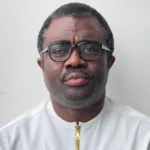SDP Chair Gabam reveals what he discussed with El-Rufai
Shehu Gabam, the National Chairman of the Social Democratic Party (SDP), recently addressed the controversy surrounding his discussions with the former governor of Kaduna State, Nasir El-Rufai. In an appearance on Channels Television’s Politics Today program on Thursday, Gabam defended his party’s actions and clarified the nature of his interactions with El-Rufai, asserting that there was nothing improper about such meetings.
Gabam was particularly puzzled by the public outcry regarding his discussions with El-Rufai. He questioned the significance of the uproar, pointing out that many critics had dismissed El-Rufai as insignificant, and yet, they were still concerned about his conversations with him. He rhetorically asked, “Why the dust about Malam Nasir El-Rufai? They say he is not significant. He’s nothing. Why the worry about El-Rufai?” Gabam further extended this critique to include Segun Sowunmi, another political figure, suggesting that if such individuals were indeed important, then the government should assign them roles that could help improve governance. According to Gabam, the public’s reaction seemed disproportionate given the circumstances.
He went on to explain the context of his meeting with El-Rufai, stating that it was a strategic discussion aimed at reviewing the political and economic situation of the country as 2024 approached. Gabam emphasized that, as a political party, the SDP had a responsibility to assess the country’s condition, especially as an opposition party. He said, “We are an opposition party with elected members in the parliament, state assemblies, and in the local governments. So, we owe it a duty as a party to look at areas where things are not going right and open the space of the party and reach out to a lot of people.” This meeting, he clarified, was part of the SDP’s efforts to evaluate the nation’s challenges and take constructive actions towards addressing them.
Gabam further noted that it was not unusual for opposition parties to engage in such discussions. He drew a comparison to the actions of the All Progressives Congress (APC) during the tenure of the People’s Democratic Party (PDP). He reminded the audience that the APC had similarly reorganized, regrouped, and even entered into a merger that ultimately led to the PDP’s defeat. According to Gabam, such strategic meetings were part of normal political processes and were essential to strengthening the party and positioning it effectively to serve the people of Nigeria.
The SDP chairman rejected the idea that his party’s discussions with El-Rufai or Segun Sowunmi were somehow wrong or unprecedented. He expressed his frustration with the exaggerated response to these interactions, suggesting that the uproar was unnecessary. He stated, “I don’t know why the brouhaha about it as if this is the first time Nasir El-Rufai visited or Segun Sowunmi, who happens to be a friend. We’ve been in this struggle for a better Nigeria, not to undermine Nigeria.”
In addition to addressing the controversy surrounding his party’s actions, Gabam also took the opportunity to critique the current administration. He expressed concern about the ability of President Bola Tinubu’s cabinet to effectively implement the president’s vision. Gabam stated that many of the ministers in Tinubu’s government lacked the capacity to drive the president’s agenda, a sentiment that further fueled his critique of the government’s performance.
He also pointed out that Nigeria was facing an unprecedented level of economic hardship, which, according to him, was largely due to the ineffective leadership of the current government. Gabam stressed that no president could expect to thrive in office when the country’s economy was in such a dire state. He made a direct comparison to former President Goodluck Jonathan’s administration, remarking that opposition to Jonathan had emerged within two years of his presidency, which ultimately led to his electoral loss. Gabam suggested that the same could potentially happen with President Tinubu if the current economic challenges were not addressed effectively.
Gabam’s remarks reflect the growing discontent with the state of affairs in Nigeria, particularly regarding the country’s economic struggles. His comments highlight the role of opposition parties in holding the government accountable and proposing alternative solutions for the country’s problems. By stressing the importance of strategic discussions and evaluations within his party, Gabam presented the SDP as a constructive force in Nigerian politics, focused on fostering dialogue and collaboration for the betterment of the country.
Overall, Gabam’s statements shed light on the internal workings of the SDP and the party’s approach to addressing Nigeria’s political and economic challenges. His defense of his party’s discussions with El-Rufai, and his critique of the current government, reveal the tensions and debates that are playing out in Nigeria’s political landscape as the country prepares for the upcoming year. Gabam’s call for a more thoughtful, collaborative approach to governance underscores the importance of dialogue and cooperation in achieving positive change.



